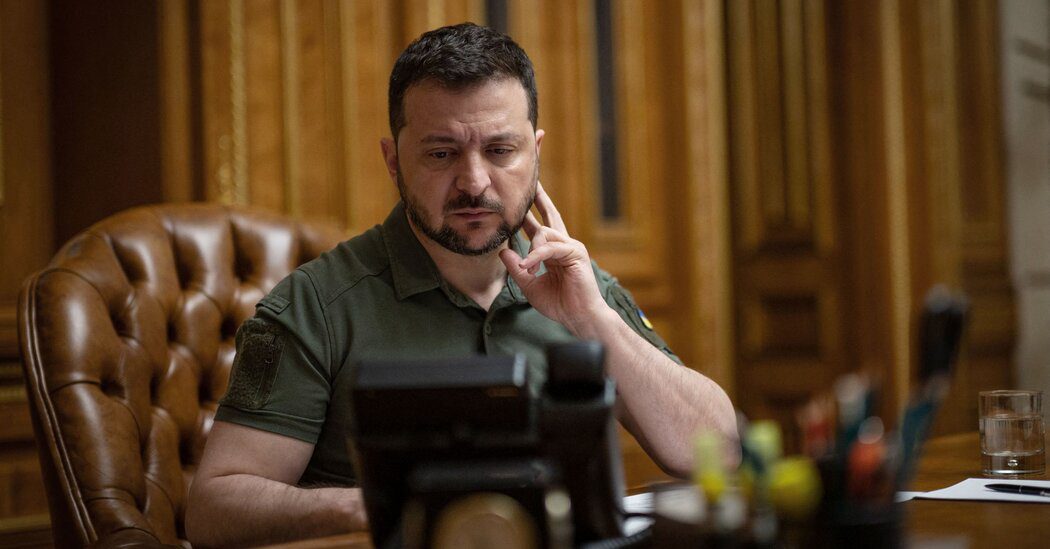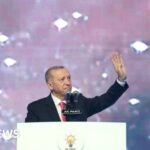Global Courant 2023-04-28 23:12:09
Two months after issuing a vague plan to end the war in Ukraine, the Chinese leader, a close ally of Vladimir V. Putin, accepted repeated requests from the Ukrainian president to talk on Wednesday.
The hour-long phone call between China’s Xi Jinping and Ukraine’s President Volodymyr Zelensky was the first known contact between the two leaders since Russia invaded Ukraine last year.
China’s official account of the discussion was notable for its omission of two words: “Russia” and “war”. It instead referred to the need for a “political settlement of the Ukrainian crisis” and warned of the danger of nuclear escalation.
For his part, Mr. Zelensky said the two leaders had “a long and meaningful telephone conversation”.
In recent months, Mr Xi has sought to polish his image as a world statesman by helping to restore diplomatic relations between Saudi Arabia and Iran and by rolling out the red carpet in Beijing for visiting world leaders such as France’s President Emmanuel Macron.
US officials and their allies have questioned Mr Xi’s ability to help broker peace in Ukraine — or even intend to do so, given his close ties to the Kremlin — but in February China released a 12- point plan outlining a path to end the war.
Russia, through its foreign ministry, offered a hushed response to the call on Wednesday.
“We note the willingness of the Chinese side to make efforts to work towards a negotiation process,” said ministry spokeswoman Maria Zakharova. She added: “Peace initiatives are unlikely to be adequately received by puppets controlled by Washington.”
The Biden administration welcomed the call as “a good thing”. But whether it “will lead to some sort of meaningful peace movement, plan or proposal — I just don’t think we know at this point,” National Security Council spokesman John F. Kirby said, according to Reuters.
While the West has globally isolated Moscow as punishment for its February 2022 invasion, Russian leaders have been working to forge new relationships with other countries and strengthen existing alliances.
China has developed an especially close relationship with Russia and shares the Kremlin’s goal of upending a world order dominated by the United States and its allies. US officials have said they believe Beijing is seriously considering sending military aid to Moscow for its war effort.
The Chinese leader has spoken to or met Mr Putin on numerous occasions, including during a trip to Moscow on March 20, about a month after China released its proposals for Ukraine, seemingly positioning himself as a potential mediator. The United States and Western allies largely rejected the plan.
But even when Mr. Xi remained in close contact with Mr. Putin, and even after China released a plan for peace, Chinese officials evaded whether Mr. Xi was to speak with the leader of the country his ally had invaded. .
Ukraine, eager to maintain good ties with Beijing, has bitten its tongue as the Chinese government has emphatically refrained from joining the countries that condemned the invasion.
Ukraine and China have long had good relations, and those ties strengthened before the war. In 2019, China was Ukraine’s largest trading partner and the largest importer of its barley and iron ore, according to a report by the Council on Foreign Relations. Ukraine was also China’s largest corn supplier and second largest arms supplier. China’s first aircraft carrier, the Liaoning, was a scrapped Soviet ship purchased in Ukraine and refurbished by the Chinese navy.
The last known contact between Mr. Xi and Mr. Zelensky was in January 2022, just weeks before the invasion, to celebrate the 30th anniversary of diplomatic ties.
But after the invasion, the official Chinese news media adopted much of the Kremlin’s talking points and disinformation about the invasion, accusing NATO of fomenting the conflict and refusing to call it an invasion.
On Wednesday, the Chinese seemed to be doing everything they could to describe Ukraine as an ally.
“President Xi noted that after 31 years of development, China-Ukraine relations have reached a level of strategic partnership, boosting the development and revitalization of the two countries,” read a reading of the Chinese ministry’s discussion of Foreign Affairs.
Mr. Zelensky said on Twitter that the call would help “give a powerful boost to the development of our bilateral relations”.
The Chinese said Mr Xi had also raised growing concerns about a possible nuclear confrontation — without mentioning that the only party to the war with nuclear weapons is Russia, or that Mr Putin and his officials themselves have repeatedly raised the possibility of a nuclear clash. have put forward. in the course of the war.
“Dialogue and negotiation are the only viable way forward,” China’s foreign ministry said. “There is no winner in nuclear wars. On the nuclear issue, all relevant parties must remain calm and exercise restraint, act truly in the interest of their own future and that of humanity, and jointly manage the crisis.”
Mr Xi reiterated points Beijing has made in the past, saying China’s “core position” was to “promote peace and talks”. Mr Xi also said that “mutual respect for sovereignty and territorial integrity” was the “political basis of Sino-Ukrainian relations”.
In their own reading of the discussion, the Ukrainians said Mr Zelensky had told the Chinese leader that “no one wants peace more than the Ukrainian people” – but that it must be a “just and lasting” peace.
“There can be no peace at the cost of territorial compromises,” Zelensky said. “Ukraine’s territorial integrity must be restored within the 1991 borders.”
The call came days after China’s ambassador to France, Lu Shaye, sparked a diplomatic firestorm in Europe after he questioned the sovereignty of nations formed after the collapse of the Soviet Union — such as Ukraine — in a televised interview. . Analysts said the call may have been in response to the flap, which hurt China’s efforts to strengthen ties with Europe as relations with the United States deteriorated.
“Xi’s strategy is to weaken the transatlantic alliance,” said Theresa Fallon, director of the Center for Russia Europe Asia Studies in Brussels. “It was very important for Xi to fix it quickly.”
The conversations between Mr. Xi and Mr. Zelensky came about as the Russian and Ukrainian forces continued to fight.
After a winter lull in military activity, Russian soldiers have recently begun to intensify their attacks in the southern region of Zaporizhzhia, targeting military positions in the fields and forests as well as cities and towns, Ukrainian officials say. They use a range of munitions, from artillery shells and rockets to Iranian-made explosive drones, the Ukrainians say.
On Wednesday, there were at least five explosions in the industrial city of Zaporizhzhia amid near-constant screams from air raid sirens.
In Washington, testifying before the House Armed Services Committee, General Christopher G. Cavoli, the top commander of U.S. armed forces in Europe, said Wednesday that nearly all of the combat vehicles Ukraine’s western allies had promised to deliver in time for an expected spring counteroffensive had arrived.
“I am confident that we have provided the material they need,” he said, “and we will continue a pipeline to support their operations as well.”
The economic battle between Russia and the West is also escalating, with Moscow nationalizing the local subsidiaries of two major European energy companies and opening the door to further acquisitions of Western assets.
Putin authorized the government to take control of local subsidiaries of Germany’s Uniper and Finland’s Fortum in a decree signed on Tuesday, a move that marked the departure of remaining Western companies from the country, which began after last year’s invasion. could speed up.
In the decreeMr. Putin justified the nationalization by saying it came in response to “unfriendly moves by the United States and allied foreign nations in violation of international law”.
Reporting was contributed by Michael Schwirtz, Eric Schmitt and Anatoly Kurmanaev.








